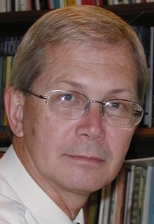Philip N. Cronenwett, a medieval historian who has written extensively on library history, the history of the book, and the history of the polar regions, has been appointed director of the Burndy Library at the Dibner Institute for the History of Science and Technology at MIT.
The trustees of the Burndy Library announced Cronenwett's appointment, which became effective Oct. 1.
In making the announcement, David Dibner, president of the library, said. "We are exceedingly pleased to have Phil Cronenwett join the Burndy Library to take this fine collection--started by my father to document and honor our scientific and technological heritage--boldly into the 21st century, where it remains ever more relevant."
"It is a privilege to be associated with this remarkable collection that is both a tribute to Bern Dibner and internationally recognized as a bibliographic treasure," Cronenwett said.
Cronenwett comes to the Burndy after a distinguished 24-year career at Dartmouth College, where he served most recently as associate director in the Office of Leadership Giving. He was the Special Collections librarian and curator of Manuscripts at the Dartmouth College Library.
The author of "The Spiral Press: A Bibliographical Checklist" (2002), Cronenwett has served as president of the New England Archivists, chair of the International Polar libraries' Colloquy and as a trustee of the American Printing History Association. His current research relates to British science in the late 19th-century Arctic.
The Burndy Library was founded in 1941 and moved to MIT in 1992 when the Dibner Institute was established. The library houses more than 50,000 volumes including rare books, manuscripts, incunabula and secondary source materials, as well as art and objects relating to the history of science and technology.
A list of the collection's highlights is nearly indistinguishable from a list of the critical texts in the western scientific tradition. There are copies of Galileo Galilei's "Sidereus Nuncius" (Venice, 1610); Tycho Brahe's "Epistolarum Astronomicarum Libri" (Uraniborg, 1596) and Sir Isaac Newton's "Principia Mathematica" (London, 1687), to name but a few titles.
A version of this article appeared in MIT Tech Talk on November 17, 2004 (download PDF).






